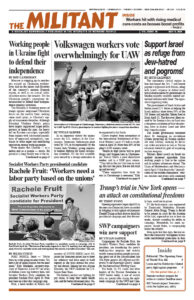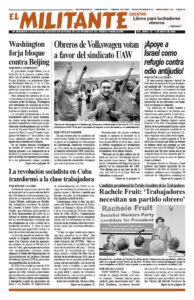ATHENS, Ga. — The Avid Bookshop here is fighting for the right to send books to prisoners. It filed a lawsuit against the sheriff and jail commander of the Gwinnett County Jail in mid-March for refusing to accept books from their shop.
“We are an independent bookseller and the jail’s policy violates our First Amendment right to free speech,” Luis Correa, the store’s operations manager, told the Militant April 16. “A lot of what we carry reflects our views on social issues.”
The lawsuit says, “Avid’s mission is not merely to sell books, but to ‘stand up for human rights, equality, and the freedom to read.’” They recommend books to customers, including shipping them to prisoners.
The jail’s policy “violates the rights of prisoners, not allowing them to explore the world through books,” Correa said. “We want to be a part of anything to make their lives more humane.” The lawsuit says that reading is one of the few means available to prisoners “for education, self-improvement and entertainment while they are incarcerated.”
On two occasions Correa mailed books for two customers to a prisoner at the jail. Both times the packages were returned with a notification they were not sent from an “authorized retailer.”
In phone calls to the jail, Correa was told the prison only accepts books from Amazon and Barnes & Noble, and that Avid could not become an authorized retailer. Officials claim this is necessary to ensure that pages would not be soaked in drugs or otherwise create safety issues.
The jail’s policy contains no criteria for designating an authorized retailer. This ensures an “arbitrary and potentially discriminatory or even viewpoint-based application of the Authorized Retailer Policy,” the lawsuit says, violating equal protection under the law guaranteed by the 14th Amendment.
The Avid Bookshop asks the court to declare the jail’s policy unconstitutional and stop authorities from enforcing it. Correa said that they have received wide support from customers, as well as from members of the American Booksellers Association and PEN America.
“This lawsuit is not just for the right of our bookshop to send books to prisoners,” Correa said, “but will serve as an example for other independent and community bookstores that want to do the same.”
Past lawsuits challenging restrictions on prisoners’ access to books in many state and federal prisons have been successful. The U.S. Supreme Court has ruled that the First Amendment encompasses the right to receive books and publications in jail. The Militant has successfully challenged attempts to ban the paper at prisons around the country.


